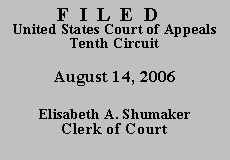 UNITED STATES COURT OF APPEALS
UNITED STATES COURT OF APPEALS
 UNITED STATES COURT OF APPEALS
UNITED STATES COURT OF APPEALS
TENTH CIRCUIT
| UNITED STATES OF AMERICA,
v.
TONY MAURICE BECKNELL, JR. |
|
On appeal, Mr. Becknell argues that his base offense level was improperly determined by attributing to him drug quantities that were not supported by reliable evidence. Aplt. Br. at 3. Mr. Becknell claims that the 565.30 grams of crack cocaine discovered in a trash can outside his home by Alcohol, Tobacco and Firearms ("ATF") agents should not have been imputed to him. He argues that the crack cocaine located outside was different, insofar as it appeared "recently cooked and moist." Aplt. Br. at 4. According to Mr. Becknell's argument then, because there was no drug manufacturing evidence found in that residence, it is error to attribute the "recently cooked" crack to him.
We review a sentencing court's determination regarding the quantity of drugs attributable to a defendant under a clearly erroneous standard of review. United States v. Lauder, 409 F.3d 1254, 1267 (10th Cir. 2005). We will not reverse a district court's factual findings on drug quantities unless the record fails to supply adequate factual support or we are left with "the definite and firm conviction that a mistake has been made." United States v. Dalton, 409 F.3d 1247, 1251 (10th Cir. 2005).
Under U.S.S.G. § 1B1.3(a), the sentencing court is entitled to consider all relevant conduct that the defendant has undertaken in order to arrive at the proper sentence. In cases involving controlled substances, the defendant is held accountable for all quantities of contraband with which he was directly involved and, in a situation involving a jointly undertaken criminal activity, he is held accountable for all reasonably foreseeable quantities of contraband that were within the scope of the criminal activity jointly undertaken. See U.S.S.G. § 1B1.3, cmt. n.2. It is the government's burden to prove the amount of drugs attributable to each defendant by a preponderance of the evidence. United States v. Morales, 108 F.3d 1213, 1226 (10th Cir. 1997).
In this case, the district court did not err in attributing the 565.30 grams of crack cocaine found in the trash can to Mr. Becknell for sentencing purposes. First, copious amounts of marijuana and crack cocaine were discovered inside Mr. Becknell's apartment. Second, two confidential informants admitted that they personally saw a kilogram of cocaine at Mr. Becknell's residence the night proceeding the search. Third, Mr. Becknell admitted to eating at Arby's restaurant earlier on the day of the search, and the 565.30 grams of crack cocaine was discovered in a discarded bag from Arby's restaurant. As such, we conclude that Mr. Becknell's argument is without merit.
AFFIRMED.
Entered for the Court
Paul J. Kelly, Jr.
Circuit Judge
*. This order and judgment is not binding precedent, except under the doctrines of law of the case, res judicata, and collateral estoppel. This court generally disfavors the citation of orders and judgments; nevertheless, an order and judgment may be cited under the terms and conditions of 10th Cir. R. 36.3.
2. After examining the briefs and the appellate record, this three-judge panel has determined unanimously that oral argument would not be of material assistance in the determination of this appeal. See Fed. R. App. P. 34(a); 10th Cir. R. 34.1(G). The cause is therefore ordered submitted without oral argument.